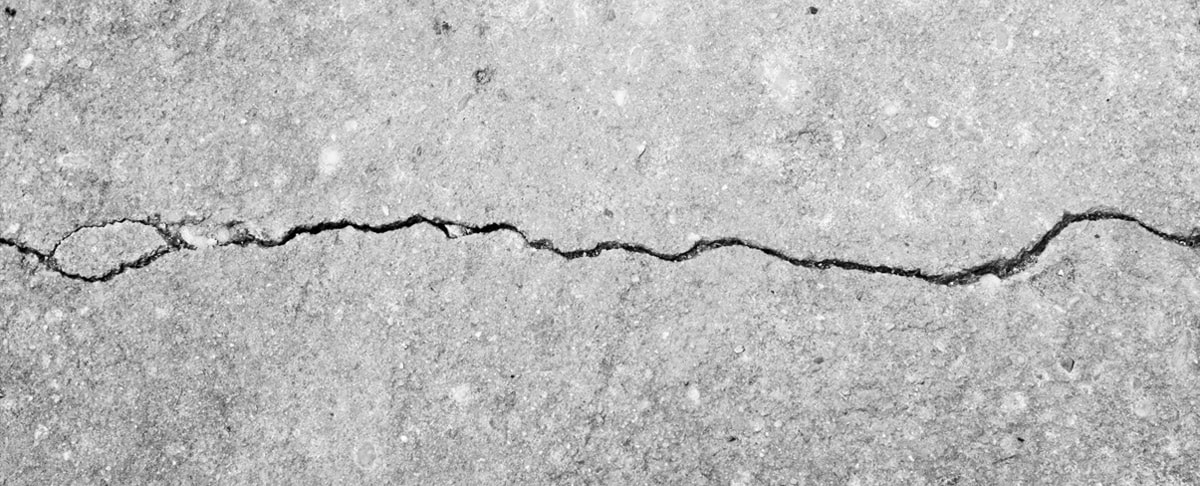If concrete has been poorly prepared or laid it can lead to scaling, pitting, chipping and cracks. This can result in an area looking old, tired and damaged. It can also create safety hazards and flooding or drainage issues on your residential or commercial property.
Some of the causes of concrete cracks are:
Shrinkage Cracks – These occur as the concrete dries and the amount of cracking will depend upon the level of water in the concrete mixture.
Thermal cracks – due to the heat of hydration when the concrete is made (cement mixed with water releases heat). A concrete mix that produces a lower heat of hydration will mean less chance of cracking.
Thermal cracks – due to the change in temperature of the structures meaning differences in temperature across the concrete slab (can be affected by weather conditions as concrete is being poured).
Cracking due to chemical reactions – Sometimes, materials used in the mix can react with one another. This can create more volume which puts pressure on the surrounding concrete, causing cracking.
Shrinkage Cracks – These occur as the concrete dries and the amount of cracking will depend upon the level of water in the concrete mixture.
Thermal cracks – due to the heat of hydration when the concrete is made (cement mixed with water releases heat). A concrete mix that produces a lower heat of hydration will mean less chance of cracking.
Thermal cracks – due to the change in temperature of the structures meaning differences in temperature across the concrete slab (can be affected by weather conditions as concrete is being poured).
Cracking due to chemical reactions – Sometimes, materials used in the mix can react with one another. This can create more volume which puts pressure on the surrounding concrete, causing cracking.
What Does Concrete Crack Repair Involve?
You may have noticed cracks in your concrete and are wondering what does concrete crack repair involve? The following information outlines the stages of repairing cracks in concrete.
Stage One - Assess the crack (Concrete Diagnosis)
There are different methods, techniques and products used to repair concrete cracks - the product and method used will vary depending upon the following factors:
Stage Two - Apply the method
Once the factors above have been considered, your concrete specialist will determine the most appropriate method of repair.
Some of the most common methods of concrete crack repair are explained below:
Concrete injection - An epoxy injection can be used on dormant cracks that are 0.005mm or greater in size. Injection points are established at close intervals along the line of the crack and then the epoxy resin is injected under pressure. The type of resin used will vary depending on the nature of the crack (e.g. size and type/status).
Concrete Resurfacing - If the problem is purely aesthetic, the concrete may be resurfaced using a cement based overlay that is mixed with bonding agents.
Protective Coating - An epoxy protective coating may be applied to the concrete surface to create a durable and water resistant top layer.
Grouting - Wider cracks may be repaired using grout which is a cement product. Grout mixtures can contain cement and water or cement, sand and water, depending on the width of the crack. Grout is often appropriate to use on concrete driveways as it can be easily poured into cracks and is compatible with the parent material (concrete).
Stage One - Assess the crack (Concrete Diagnosis)
There are different methods, techniques and products used to repair concrete cracks - the product and method used will vary depending upon the following factors:
- Type/status of crack - Is the crack a dormant crack (unlikely to extend further) or live (likely to have further movement)
- Width and depth of the crack
- Cause of crack - If the root cause is ongoing a flexible product will be required to prevent further cracks appearing.
Stage Two - Apply the method
Once the factors above have been considered, your concrete specialist will determine the most appropriate method of repair.
Some of the most common methods of concrete crack repair are explained below:
Concrete injection - An epoxy injection can be used on dormant cracks that are 0.005mm or greater in size. Injection points are established at close intervals along the line of the crack and then the epoxy resin is injected under pressure. The type of resin used will vary depending on the nature of the crack (e.g. size and type/status).
Concrete Resurfacing - If the problem is purely aesthetic, the concrete may be resurfaced using a cement based overlay that is mixed with bonding agents.
Protective Coating - An epoxy protective coating may be applied to the concrete surface to create a durable and water resistant top layer.
Grouting - Wider cracks may be repaired using grout which is a cement product. Grout mixtures can contain cement and water or cement, sand and water, depending on the width of the crack. Grout is often appropriate to use on concrete driveways as it can be easily poured into cracks and is compatible with the parent material (concrete).
The Take Away
If you notice cracks on your concrete driveway, the best thing you can do is contact a concrete specialist who will determine what the cause of the crack is and what the best method of repair will be. Most cracks can be repaired, which saves the money and time that would be required for concrete replacement.
Suburban Earthworks offer a complete range of concrete repair and restoration solutions. We have a comprehensive range of concrete injection and resurfacing products to cater for small jobs such as cosmetic concrete crack repairs on a residential property right through to structural concrete repairs on industrial or commercial premises. If you would like a free consultation and quote please Contact us.
Suburban Earthworks offer a complete range of concrete repair and restoration solutions. We have a comprehensive range of concrete injection and resurfacing products to cater for small jobs such as cosmetic concrete crack repairs on a residential property right through to structural concrete repairs on industrial or commercial premises. If you would like a free consultation and quote please Contact us.


